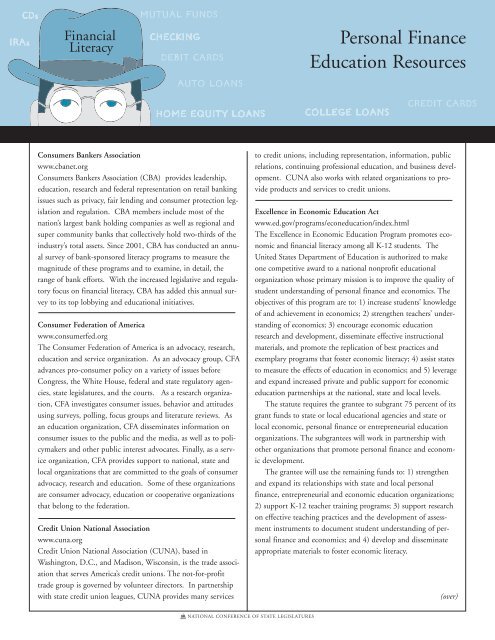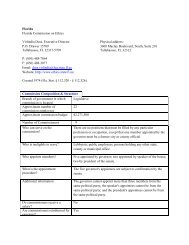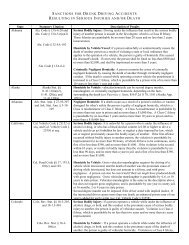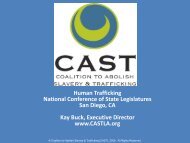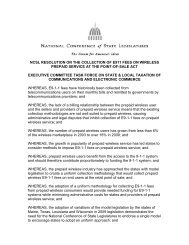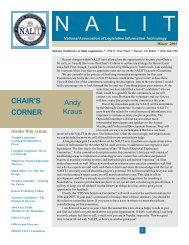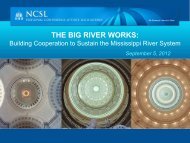Printer Friendly Version - National Conference of State Legislatures
Printer Friendly Version - National Conference of State Legislatures
Printer Friendly Version - National Conference of State Legislatures
Create successful ePaper yourself
Turn your PDF publications into a flip-book with our unique Google optimized e-Paper software.
Consumers Bankers Association<br />
www.cbanet.org<br />
Consumers Bankers Association (CBA) provides leadership,<br />
education, research and federal representation on retail banking<br />
issues such as privacy, fair lending and consumer protection legislation<br />
and regulation. CBA members include most <strong>of</strong> the<br />
nation’s largest bank holding companies as well as regional and<br />
super community banks that collectively hold two-thirds <strong>of</strong> the<br />
industry’s total assets. Since 2001, CBA has conducted an annual<br />
survey <strong>of</strong> bank-sponsored literacy programs to measure the<br />
magnitude <strong>of</strong> these programs and to examine, in detail, the<br />
range <strong>of</strong> bank efforts. With the increased legislative and regulatory<br />
focus on financial literacy, CBA has added this annual survey<br />
to its top lobbying and educational initiatives.<br />
Consumer Federation <strong>of</strong> America<br />
www.consumerfed.org<br />
The Consumer Federation <strong>of</strong> America is an advocacy, research,<br />
education and service organization. As an advocacy group, CFA<br />
advances pro-consumer policy on a variety <strong>of</strong> issues before<br />
Congress, the White House, federal and state regulatory agencies,<br />
state legislatures, and the courts. As a research organization,<br />
CFA investigates consumer issues, behavior and attitudes<br />
using surveys, polling, focus groups and literature reviews. As<br />
an education organization, CFA disseminates information on<br />
consumer issues to the public and the media, as well as to policymakers<br />
and other public interest advocates. Finally, as a service<br />
organization, CFA provides support to national, state and<br />
local organizations that are committed to the goals <strong>of</strong> consumer<br />
advocacy, research and education. Some <strong>of</strong> these organizations<br />
are consumer advocacy, education or cooperative organizations<br />
that belong to the federation.<br />
Credit Union <strong>National</strong> Association<br />
www.cuna.org<br />
Credit Union <strong>National</strong> Association (CUNA), based in<br />
Washington, D.C., and Madison, Wisconsin, is the trade association<br />
that serves America’s credit unions. The not-for-pr<strong>of</strong>it<br />
trade group is governed by volunteer directors. In partnership<br />
with state credit union leagues, CUNA provides many services<br />
NATIONAL CONFERENCE OF STATE LEGISLATURES<br />
Personal Finance<br />
Education Resources<br />
to credit unions, including representation, information, public<br />
relations, continuing pr<strong>of</strong>essional education, and business development.<br />
CUNA also works with related organizations to provide<br />
products and services to credit unions.<br />
Excellence in Economic Education Act<br />
www.ed.gov/programs/econeducation/index.html<br />
The Excellence in Economic Education Program promotes economic<br />
and financial literacy among all K-12 students. The<br />
United <strong>State</strong>s Department <strong>of</strong> Education is authorized to make<br />
one competitive award to a national nonpr<strong>of</strong>it educational<br />
organization whose primary mission is to improve the quality <strong>of</strong><br />
student understanding <strong>of</strong> personal finance and economics. The<br />
objectives <strong>of</strong> this program are to: 1) increase students’ knowledge<br />
<strong>of</strong> and achievement in economics; 2) strengthen teachers’ understanding<br />
<strong>of</strong> economics; 3) encourage economic education<br />
research and development, disseminate effective instructional<br />
materials, and promote the replication <strong>of</strong> best practices and<br />
exemplary programs that foster economic literacy; 4) assist states<br />
to measure the effects <strong>of</strong> education in economics; and 5) leverage<br />
and expand increased private and public support for economic<br />
education partnerships at the national, state and local levels.<br />
The statute requires the grantee to subgrant 75 percent <strong>of</strong> its<br />
grant funds to state or local educational agencies and state or<br />
local economic, personal finance or entrepreneurial education<br />
organizations. The subgrantees will work in partnership with<br />
other organizations that promote personal finance and economic<br />
development.<br />
The grantee will use the remaining funds to: 1) strengthen<br />
and expand its relationships with state and local personal<br />
finance, entrepreneurial and economic education organizations;<br />
2) support K-12 teacher training programs; 3) support research<br />
on effective teaching practices and the development <strong>of</strong> assessment<br />
instruments to document student understanding <strong>of</strong> personal<br />
finance and economics; and 4) develop and disseminate<br />
appropriate materials to foster economic literacy.<br />
(over)


